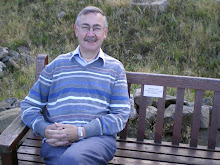




On Friday when I was being shown the local trees by Penny, I heard the distant sound of singing floating over the landscape. It was coming from the Presbyterian church in Ngyen-Mbo. We went down to the source of the singing, a sturdy church hall belonging to the Presbyterians.
There local people (mostly women but some men) had gathered in this building with no windows, no piano and no electricity to learn some items for a singing festival. The song or hymn they were singing was in the local Bali language called Mungaka. No one was using paper or sheet music. (In fact the literacy rate for this language is fairly low. It is very much the language of the heart and hearth, and used within the community.) The conductor presented the four parts himself, teaching words and tune at the same time. I was witnessing “note bashing”, that very first introduction to a piece. He sang, then the people with that voice followed on copying him – sometimes an octave higher. I’d like to see Trystan practice this technique with the Conwy Valley Mixed Choir or with Cor Meibion Maelgwn. It worked! The singers were used to this approach, and they responded positively. The sound was breath-takingly good. They were very disciplined too, in focusing on the task in hand. Penny and I applauded them, then on a whim, I sang them Calon Lan as a solo (no sniggering there!) and they were polite enough to applaud. One lady just in front of me was even picking up the melody and humming along.
Then we went on to a wake in the village at the house of a highly respected local man who was interested in the betterment of his community and had recently passed away. Badges showing an image of the dear departed were sold to raise money for the food – traditional African food. In the back yard women were preparing and cooking all sorts of ingredients. This was clearly a cheerful, co-operative activity, and although this was a wake, there was much merriment. Coco-yams were being pounded in a wooden trough-like mortar. The resultant white mixture is wrapped in palm leaves, then cooked. The result is a sort of gelatinous mashed potato-like substance which served with njama njama, made from huckleberry leaves, palm oil tomatoes, and onions. Women were preparing fish – the head is the best bit - while men chopped wood for the fires. Oh, and I had my first taste of palm wine - and I can't remember much after that.
There local people (mostly women but some men) had gathered in this building with no windows, no piano and no electricity to learn some items for a singing festival. The song or hymn they were singing was in the local Bali language called Mungaka. No one was using paper or sheet music. (In fact the literacy rate for this language is fairly low. It is very much the language of the heart and hearth, and used within the community.) The conductor presented the four parts himself, teaching words and tune at the same time. I was witnessing “note bashing”, that very first introduction to a piece. He sang, then the people with that voice followed on copying him – sometimes an octave higher. I’d like to see Trystan practice this technique with the Conwy Valley Mixed Choir or with Cor Meibion Maelgwn. It worked! The singers were used to this approach, and they responded positively. The sound was breath-takingly good. They were very disciplined too, in focusing on the task in hand. Penny and I applauded them, then on a whim, I sang them Calon Lan as a solo (no sniggering there!) and they were polite enough to applaud. One lady just in front of me was even picking up the melody and humming along.
Then we went on to a wake in the village at the house of a highly respected local man who was interested in the betterment of his community and had recently passed away. Badges showing an image of the dear departed were sold to raise money for the food – traditional African food. In the back yard women were preparing and cooking all sorts of ingredients. This was clearly a cheerful, co-operative activity, and although this was a wake, there was much merriment. Coco-yams were being pounded in a wooden trough-like mortar. The resultant white mixture is wrapped in palm leaves, then cooked. The result is a sort of gelatinous mashed potato-like substance which served with njama njama, made from huckleberry leaves, palm oil tomatoes, and onions. Women were preparing fish – the head is the best bit - while men chopped wood for the fires. Oh, and I had my first taste of palm wine - and I can't remember much after that.
Pictures show the brother of the deceased, the teamwork preparing food and the choir.

2 comments:
Dad, were you drunk?!
No, I was very good. In fact I had to take the night bus to Douala - but more about that soon.
Post a Comment